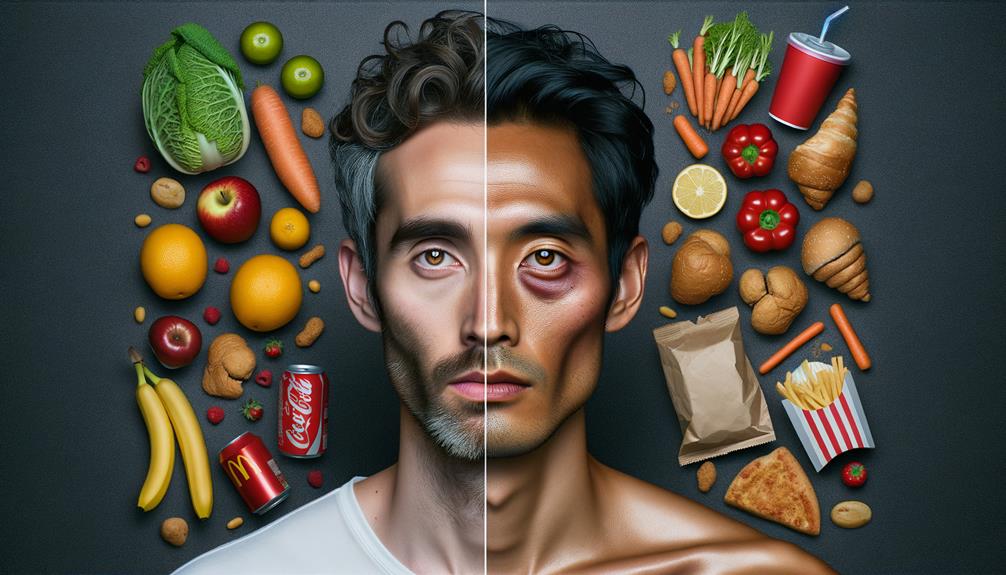Have you ever wondered if what you eat has an impact on the health of your skin? It’s time to explore the connection between your diet and the condition of your skin. You may be surprised to learn that the food you consume plays a crucial role in the appearance and overall health of your skin. From providing essential nutrients to maintaining proper hydration levels, your diet can have a direct effect on the radiance and vitality of your complexion. But what specific foods should you be incorporating into your diet? And which ones should you avoid? In this article, we will uncover the secrets to achieving healthier skin through proper nutrition, leaving you with a glowing complexion that will make heads turn.
The Importance of a Balanced Diet for Men

A balanced diet is crucial for maintaining optimal skin health and grooming habits in men. The benefits of antioxidants in the diet cannot be overstated when it comes to skin health. Antioxidants help to protect the skin from damage caused by free radicals, which can lead to premature aging and other skin issues. Vitamins, such as vitamin A, C, and E, are also essential for healthy skin. These vitamins play a crucial role in collagen production, which helps to keep the skin firm and elastic. Additionally, they have antioxidant properties and can help to reduce inflammation in the skin.
On the other hand, the impact of sugar on skin health cannot be ignored. High sugar intake can lead to a process called glycation, which affects the collagen and elastin fibers in the skin, causing it to become stiff and less supple. This can contribute to the formation of wrinkles and sagging skin. Similarly, excessive alcohol consumption can have detrimental effects on the skin. Alcohol dehydrates the body, including the skin, leading to dryness and dullness. It can also dilate blood vessels, causing redness and inflammation.
Lastly, proper hydration is essential for healthy skin. Drinking enough water helps to keep the skin hydrated and supple, improving its overall appearance. It also aids in the removal of toxins from the body, which can contribute to clearer and healthier skin. In conclusion, a balanced diet that includes antioxidants, vitamins, limited sugar intake, moderate alcohol consumption, and adequate hydration is essential for maintaining optimal skin health and grooming habits in men.
Nutrients for Men’s Healthy Skin
To optimize skin health and grooming habits, men should focus on obtaining essential nutrients for their skin through their diet. Dietary antioxidants play a crucial role in maintaining healthy skin by protecting it from oxidative stress caused by environmental factors such as pollution and UV radiation. Vitamin C is a potent antioxidant that also plays a vital role in collagen synthesis, which is essential for skin elasticity and firmness. Including foods rich in vitamin C, such as citrus fruits, berries, and leafy greens, can help support collagen production and promote youthful-looking skin.
Another essential nutrient for men’s healthy skin is zinc. Zinc is involved in various cellular processes, including wound healing. It helps to repair damaged skin and supports the growth of new tissue. Foods high in zinc include oysters, lean meats, nuts, and legumes. Selenium is another important mineral that contributes to skin health. It works as an antioxidant and helps protect the skin from UV damage. Including foods like Brazil nuts, seafood, and whole grains in your diet can provide an adequate amount of selenium.
Vitamin E is known for its antioxidant properties and its role in preventing skin aging. It helps to neutralize free radicals, which can accelerate the aging process of the skin. Foods rich in vitamin E include almonds, sunflower seeds, spinach, and avocado. By incorporating these essential nutrients into your diet, you can support your skin’s health and maintain a well-groomed appearance.
Foods to Avoid for Clear Skin
Avoiding certain foods can help promote clear and healthy skin. When it comes to achieving clear skin, it’s important to be mindful of the foods you consume. Dairy products have long been associated with acne breakouts. Research suggests that the hormones present in milk and other dairy products can increase the production of sebum, leading to clogged pores and the development of acne.
Sugar is another culprit when it comes to skin inflammation. High intake of sugary foods and beverages can cause a spike in insulin levels, which triggers inflammation in the body. This inflammation can manifest on the skin in the form of redness, swelling, and acne breakouts.
Processed foods are often packed with additives, preservatives, and unhealthy fats that can wreak havoc on your skin. These foods have a high glycemic index, meaning they cause a rapid spike in blood sugar levels. This can lead to increased sebum production and the development of acne.
High glycemic foods, in general, can contribute to acne breakouts. These foods, such as white bread, white rice, and sugary snacks, can cause a surge in insulin levels and inflammation, ultimately leading to skin problems.
Lastly, fried foods should be avoided if you want to maintain clear skin. Fried foods are typically high in unhealthy fats and can lead to skin congestion, clogged pores, and acne breakouts.
Hydration and Skin Health for Men
Hydrating your body adequately is crucial for maintaining optimal skin health as a man. Proper hydration helps to prevent dryness, flakiness, and dullness, promoting a smooth and youthful complexion. In addition to drinking plenty of water, incorporating moisturizers into your skincare routine is essential.
Moisturizers for men are specifically formulated to address the unique needs of male skin. Look for products that contain hydrating ingredients such as hyaluronic acid, glycerin, and ceramides. These ingredients help to lock in moisture, replenish the skin’s natural barrier, and improve skin elasticity.
Incorporating a skincare routine into your daily regimen is also important for maintaining hydrated skin. Cleanse your face twice a day with a gentle cleanser to remove dirt, oil, and impurities. Follow up with a hydrating toner to balance the skin’s pH levels and prep it for moisturization. Applying a lightweight moisturizer with SPF during the day provides sun protection for men, preventing sun damage and premature aging.
To give your skin an extra boost of hydration, consider using hydrating face masks once or twice a week. These masks are infused with hydrating ingredients that penetrate deeply into the skin, leaving it plump and radiant.
Superfoods for Men’s Skin Radiance
Incorporate these superfoods into your diet to enhance your skin’s radiance and promote a healthy complexion. Antioxidant-rich foods are essential for maintaining skin health and radiance. Berries such as blueberries, strawberries, and blackberries are packed with antioxidants that protect against skin damage caused by free radicals. Other antioxidant-rich foods include dark leafy greens like spinach and kale, as well as tomatoes, carrots, and sweet potatoes.
In addition to consuming antioxidant-rich foods, nutritional supplements can also contribute to skin health. Omega-3 fatty acids, found in fish oil supplements, help to reduce inflammation and promote a healthy, glowing complexion. Collagen supplements can also support skin elasticity and reduce the appearance of fine lines and wrinkles.
Incorporating a proper skincare routine into your daily regimen is crucial for maintaining healthy skin. Cleansing your face twice a day and using a moisturizer can help prevent acne and keep your skin hydrated. Additionally, using sunscreen daily can protect against premature aging and sun damage.
Dietary tips for reducing acne in men include avoiding high-glycemic foods such as sugary snacks and processed carbohydrates, as they can contribute to breakouts. Instead, opt for a diet rich in fruits, vegetables, and lean proteins.
Lastly, certain foods can help prevent premature aging of the skin. Green tea and dark chocolate, for example, contain antioxidants that protect against damage from UV rays and promote youthful-looking skin.
The Role of Omega-3 Fatty Acids
Omega-3 fatty acids play a crucial role in promoting skin health and maintaining a youthful appearance. These essential fats are known for their numerous benefits, including their positive impact on skin health. Omega-3 fatty acids help to moisturize the skin, reduce inflammation, and protect against sun damage.
Omega-3 benefits for the skin are primarily attributed to their anti-inflammatory properties. Inflammation is a key factor in various skin conditions, such as acne, psoriasis, and eczema. By reducing inflammation, omega-3 fatty acids can help alleviate symptoms and improve overall skin health.
Sources of omega-3 fatty acids include fatty fish like salmon, mackerel, and sardines, as well as plant-based sources like flaxseeds, chia seeds, and walnuts. Incorporating these foods into your diet can provide a natural and effective way to increase your omega-3 intake.
If you struggle to consume enough omega-3 fatty acids through your diet, you may consider omega-3 supplements. These supplements are widely available and can help ensure you are getting an adequate amount of these beneficial fats.
Omega-3 deficiency can lead to dry skin, dull complexion, and increased susceptibility to skin damage. By incorporating omega-3 fatty acids into your diet, either through whole foods or supplements, you can support your skin’s health and achieve a more youthful appearance.
Probiotics and Gut Health for Men’s Skin
Probiotics, known for their beneficial effects on gut health, can also play a significant role in improving men’s skin health. The human gut is home to trillions of bacteria, collectively known as the gut microbiota. These bacteria are involved in various bodily functions, including digestion and immune system regulation. Recent studies have shown a strong correlation between gut bacteria and skin health, suggesting that a healthy gut may lead to healthier skin.
One of the key benefits of probiotics is their ability to reduce skin inflammation. Inflammation is a common factor in skin conditions such as acne, eczema, and psoriasis. By promoting a balanced gut microbiota, probiotics help to regulate the immune response and reduce the production of inflammatory chemicals in the body. This, in turn, can lead to a reduction in skin inflammation and improve the overall appearance of the skin.
In addition to reducing inflammation, probiotics also contribute to better digestive health. A healthy digestive system ensures that essential nutrients are effectively absorbed and waste products are eliminated efficiently. This can have a direct impact on the health and appearance of the skin. When the body is properly nourished, the skin receives the necessary vitamins, minerals, and antioxidants it needs to maintain a healthy complexion.
To incorporate probiotics into your skincare routine, consider consuming probiotic-rich foods such as yogurt, sauerkraut, and kimchi. Alternatively, you can opt for probiotic supplements. It is important to note that the effectiveness of probiotics may vary from person to person, so it is advisable to consult with a healthcare professional before making any significant changes to your diet or skincare routine.
Conclusion
In conclusion, the impact of diet on men’s skin health cannot be underestimated. By maintaining a balanced diet and incorporating key nutrients, men can achieve a healthier and more radiant complexion. Avoiding certain foods and staying hydrated is also crucial for clear skin. Superfoods, omega-3 fatty acids, and probiotics play a significant role in nourishing the skin from within. So, remember, what you eat directly affects your skin, so choose wisely for a glowing and youthful appearance.




